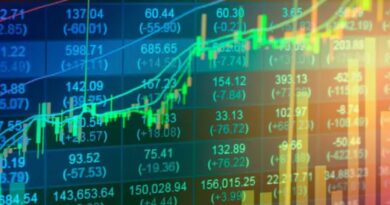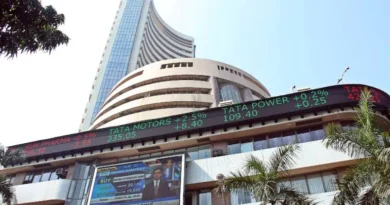Stock Market Today: Top 10 things to know before the market opens on 8th September
The benchmark Sensex and Nifty indices are likely to open marginally higher on September 8 as trends in the GIFT Nifty indicate a positive start for the broader index with a gain of 24 points.
The BSE Sensex jumped 385 points to 66,266, while the Nifty50 rose 116 points to 19,727 and formed long bullish candlestick pattern on the daily charts, with firmly maintaining above falling resistance trendline.
The bulls were able to push Nifty higher following a rangebound trading period in the preceding few days.
The sentiment remains positive as long as the index sustains above 19,550,” said Rupak De, senior technical analyst at LKP Securities.
The pivot point calculator indicates that the Nifty may be taking support at 19,600, followed by 19,556 and 19,484.
On the flip side, 19,743 can act as the key resistance followed by 19,787 and 19,858.
Stay tuned to Moneycontrol to find out what happens in the currency and equity markets today.
We have collated a list of important headlines across news platforms, which could impact Indian as well as international markets.
GIFT Nifty
The GIFT Nifty indicates a marginally positive start for the broader index with a gain of 24 points.
GIFT Nifty futures stood at 19,786 points after making a high of 19,803 points.
US Markets
The Nasdaq Composite fell for a fourth session Thursday as concerns resurfaced over the Federal Reserve’s interest rate policy path, and whether policymakers will enact another hike this year.
The tech-heavy Nasdaq sold off 0.89 percent to end at 13,748.83, while the S&P 500 slipped 0.32 percent to finish at 4,451.14. The Dow Jones Industrial Average added 57.54 points, or 0.17 percent, to settle at 34,500.73.
People were hoping the Fed would be on hold for the rest of the year, but it’s possible that we got one or two more rate hikes to come,” said Chris Zaccarelli, chief investment officer at Independent Advisor Alliance.
All things being equal, that’s a little bit of a negative for the stock market, which was expecting the Fed to potentially be done for the year.”
European Markets
European stock markets closed slightly lower Thursday, with investors assessing US inflationary pressures and euro zone data.
The benchmark Stoxx 600 ended down 0.14 percent, logging its seventh consecutive negative session.
It marks the longest losing streak for the index since February 2018, according to Reuters.
Mining stocks led declines, down by 2.2 percent, while utilities stocks climbed 1.4 percent.
Global market sentiment has taken a turn for the worse in recent days as investors focus on weak Chinese data, higher government bond yields and the interest rate environment, with renewed inflationary concerns in the US.
The euro zone on Thursday released final figures indicating the economy grew by 0.1 percent in the second quarter versus the prior period, lower than the 0.3 percent growth estimated in a preliminary reading.
The bloc is continuing to narrowly skirt a recession after GDP growth for the first quarter was revised up from a 0.1 percent contraction to flat.
Asian Markets
Asia-Pacific markets were mixed on Friday as Japan released revised second quarter gross domestic product figures.
Japan’s Nikkei 225 extended losses from Wednesday, falling 0.37 percent, while the Topix was down 0.42 percent.
Second quarter GDP in Japan expanded by 4.8 percent on a quarter-on-quarter annualized basis, a smaller climb than the 6 percent seen in the preliminary estimates and lower than the 5.5 percent expected in a Reuters poll.
Hong Kong markets may see limited trading today after the city’s observatory issued a black rainstorm” warning.
Under Hong Kong Exchange guidelines, the pre-opening session will be cancelled if a black rainstorm warning is in force after 7 a.m Hong Kong time.
Should it be lifted before 9 a.m., the morning session will begin on the first half hour at least two hours after the discontinuation of the signal.
Should the signal still be in force after 9 a.m., the morning session will be cancelled, and if it extends beyond 12 p.m., there will no trading for the day.
In Australia, the S&P/ASX 200 climbed marginally. South Korea’s Kospi was also just below the flatline, and the Kosdaq rose 0.6%.
Debt recovery remains a challenge in India, says Deepak Parekh
Chairman of HDFC Ltd, Deepak Parekh highlighted that the debt recovery mechanism in India remains a challenge and needs to be tightened. “There is a need for development in the debt recovery system in India.
Even after the presence of the National Company Law Tribunal (NCLT) and Securitisation and Reconstruction of Financial Assets and Enforcement of Security Interest Act (SARFAESI), the efficacy of the legal system is not right,” Parekh said at the Global Fintech Festival in Mumbai on September 7.
Parekh also highlighted that compared to global legal systems, India has a slow mechanism.
Decisions from NCLT need to come in quicker. Maybe it is understaffed but that needs to be addressed,” Parekh said.
Christopher Wood says India is his favourite among all emerging markets
Christopher Wood, the Global Head of Equity Strategy at Jefferies, an investment bank, reiterated that India was the ultimate choice for investors in a recent interview with Bloomberg Television.
Despite the array of challenges, Wood was confident that India has the potential to emerge as the standout performer among emerging markets in the coming decade.
The market I want to be in Asia for the next 10 years is India,” he proclaimed.
Banks will have to shut shop if they don’t innovate, says KV Kamath
Veteran banker KV Kamath advised banks to adapt, learn and modify the policies and working model to keep functioning.
For banks who fail to do so, they might have to close shops, Kamath said.
Speaking at the Global Fintech Festival in Mumbai on September 7, Kamath highlighted that banks have to work with the new-age fintech companies to remain and prosper in the business.
“Banks have no option but to collaborate and partner with fintech companies. Fintechs should look at global opportunities in the financial market.
There are places in the world where there are immense opportunities available in the market,” Kamath said.
Jupiter Life Line Hospitals IPO subscribed 3.3 times on second day of bidding
Jupiter Life Line Hospitals IPO continued to attract investors’ attention on its second day of bidding.
Investors have bought 2.8 crore equity shares against the offer size of 84.97 lakh shares, resulting in the IPO getting subscribed 3.3 times, backed majorly by HNIs and retail.
The reasonable valuations, likely becoming debt-free post issue, and strong financial performance with healthy ratios are some of key reasons behind the good subscription numbers, experts said.
The portion reserved for high networth individuals, which is 15 percent in the total issue size, has been booked 6.63 times, and that of retail investors, which is 35 percent in the offer, 3.08 times.
Qualified institutional investors have also been gradually increasing their support, buying shares 1.12 times their part which is 50 percent.
In war against inflation, you need both sword and shield to win: Kalpen Parekh
When it comes to beating inflation, investing in equities is often considered a better bet, especially in the long run.
But Kalpen Parekh, MD & CEO, DSP Mutual Funds, feels that in the war against inflation, while equities are the sword that can kill inflation, one needs to have a shield or a layer of protection.
Parekh was speaking during a recent media interaction to announce DSP’s Multi Asset Allocation Fund.
According to Parekh, without a shield, you will not be able to get ahead in the war.
While we are not trying to predict the market this is just our assumption we think that in today’s market going in with just bravado will be less beneficial,” he says.
Oil Prices
Oil prices eased on Thursday as an uncertain economic outlook for China outweighed expectations of tighter supplies from extended supply cuts in Saudi Arabia and Russia.
Brent crude futures fell 18 cents, or 0.2 percent, to $90.42 a barrel by 1323 GMT, while US West Texas Intermediate crude (WTI) futures fell 21 cents, or 0.2 percent to $87.33.
Both benchmarks had spiked earlier in the week after Saudi Arabia and Russia, the world’s top two oil exporters, extended voluntary supply cuts to the year-end.
These were on top of the April cuts agreed by several OPEC+ producers running to the end of 2024. Market participants also digested mixed data from China.
Overall exports fell 8.8% in August year on year and imports contracted 7.3 percent. But crude imports surged 30.9 percent.
Dollar Index
The Dollar index traded 0.09 percent higher in futures at 104.95, whereas the value of one dollar hovered near Rs 83.16.
Gold Prices
Gold held steady after briefly trimming gains on Thursday as data showed tightness in the US job market, with focus now shifting to a host of Federal Reserve speakers for cues on interest rate hikes.
Spot gold was up 0.1 percent to $1,918.49 per ounce by 10:25 a.m. EDT (1425 GMT), after hitting a one-week low on Wednesday.
US gold futures fell 0.1 percent to $1,943.00 per ounce.
Gold is choppy due to a lack of fresh fundamental news and it’s just trading on technicals favoring the bearish camp at the moment, but some short covering on the dips based on some perceived value buying is keeping it afloat, said Jim Wyckoff, senior market analyst at Kitco.
FIIs and DIIs
Foreign institutional investors (FII) sold shares worth Rs 758.55 crore, while domestic institutional investors (DII) bought Rs 28.11 crore worth of stocks on September 7, provisional data from the National Stock Exchange (NSE) showed.
Bymoneycontrol




